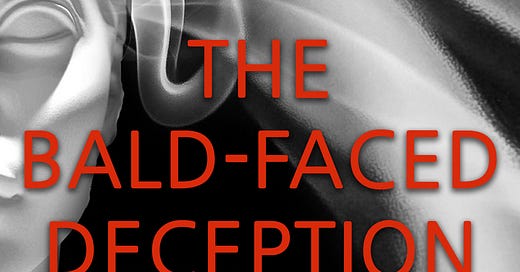I worked with Jodene Weber (no relation!) on her debut suspenseful mystery, The Bald-Faced Deception. It felt so special and so different from anything I’d ever read before…and now I know why! Jodene shares why she had no qualms following her own rules and letting the traditional tropes go.
My love of mysteries and investigation began at age seven, while wandering the aisles of the local Shopko store. The book section was located right next to the toy department, and one day a display of the yellow-spined Nancy Drew Mystery series caught my eye. Part of the appeal was that each book promised a different mystery: a hidden staircase, a ghost in a hall, or a spooky whispering statue. But, for a curious elementary school kid like me, the character of Nancy Drew was a surprise, too. She wasn’t a man wearing a uniform or a beige trench coat covering a shiny badge, and she didn’t work for a big three-letter agency. She was simply a young woman with two best friends, a cute boyfriend, and a spiffy blue convertible.
At the time, I didn’t concern myself with the fact that she lacked steady employment or always seemed to be on vacation, because it was the absence of traditional tropes that made her stories fascinating. Nancy followed clues by donning a wet suit and snorkeling with sharks, or by grabbing a parachute pack and learning to skydive. She was quick to assess behavior— sniffing out oddities, noting nuances, and recognizing situational parallels. There wasn’t any crime Nancy couldn’t solve, even though she wasn’t a conventional detective.
Looking back, it’s really no surprise that my love of Nancy Drew led me to want to write suspense novels, or to my initial career as a television journalist and news anchor. Journalism combined investigation with written and spoken words, two things I loved. But I soon found out that “on-air” life isn’t as glamorous as some might think, and tropes abounded about how female journalists were expected to “present” themselves to viewers. It bothered me when people cared more about what lipstick I wore than the stories I wrote. Fortunately for me, a trip to the movies changed everything.
Silence of the Lambs dominated the box office in the early 1990s, and once again, I gravitated to a story throwing a classic trope aside. It was massively appealing. Perhaps the most unrealistic FBI character ever written, Clarice Starling was inexperienced, and technically, she didn’t have arrest powers or legal authorization to carry a service weapon. It didn’t matter. I left that movie determined to find out how a young woman like me could become an FBI Agent. And then, I went and did it.
At the beginning of the pandemic, I retired from my twenty-two-year career as a Special Agent with the Federal Bureau of Investigation, excited to begin another career writing suspense novels. Everyone expected my first book would contain a female FBI agent character, but she would still fit in the traditional trope mold. She’d be a boozy, bitter woman caught in the shadows of her male counterparts, or a frazzled, overworked woman juggling depression and family while fighting crime. Truth-be-told, most female agents at the FBI are fantastic multi-taskers, and most lead very balanced lives. Plus, working for the FBI isn’t always like it’s portrayed in books, television, or movies. Not every surveillance or interrogation leads to a major revelation or a stunning clue, and some days are chalk full of paperwork, reports, red tape, and a healthy dose of misogyny.
Here’s another secret: The most fascinating aspect of my FBI job wasn’t me. It was the lessons I learned from the victims I met. No two were exactly alike, and many experienced the worst tragedy imaginable at a time when they were already dealing with serious illnesses, unemployment, divorce, financial hardship, harassment, or the loss of a child. The complexities of life created general mistrust for many victims long before the crime occurred. For each person who struggled to regain trust because of criminal victimization, there was someone else who learned or was taught never to trust others in the first place. This was the story I wanted to write, because the dichotomy between trust and mistrust permeated every case I worked on.
And then, I became a potential crime victim myself.
9/11 responders who have died due to a designated health condition caused by the terror attacks are now included in the official 9/11 death count, which is growing all the time. I was a 9/11 responder at the Pentagon, and I have experienced many complex health issues in the years that followed 9/11. A parotid tumor was ripped from my skull, my two hips were replaced, and I underwent extensive spinal fusion all within four years before I turned fifty. My various surgeons couldn’t explain why parts of my skeleton disintegrated or why my tumor formed, but exposure to toxins at the Pentagon is believed to be the likely culprit.
Around the time of my surgeries, I also started experiencing unexplained hair loss, and I found I worried as much about losing my hair as I did about survival, malignancy, facial disfigurement, and the ability to walk again. How ironic that a former journalist who craved people would ignore her looks, was suddenly terrified no one would ever want to look at her again. I also grappled with shame for worrying about potential scars, limps, thinning hair or bald spots when a lot of my fellow 9/11 responders were dying. And, like so many of the victims I worked with, I was angry, frustrated, and afraid.
My debut novel The Bald-Faced Deception depicts a suspenseful mystery, centered around two women afraid to trust, each for entirely different reasons. Both are crime victims, and one is grappling with alopecia due to toxin exposure. Their journeys of self-actualization are the subplot to a suspenseful caper, but just like Nancy Drew, they don’t fit the mold of traditional tropes. When I set out to write this novel, I put a ton of FBI experience into building these flawed characters, and I flexed. I told multiple FBI stories without an FBI agent, and I didn’t follow any antiquated or imaginary “writer’s rules” about what constituted the proper formula for a crime novel. There’s no reason a suspense novel can’t address why women don’t always trust other women, or why victims are suspicious of the very law enforcement officers who say they want to help them. If there’s one lesson I learned from reading Nancy Drew, it’s that some of the best stories and life experiences are obtained when you let the tropes go.
Jodene Weber is the host of the popular true crime podcast Caught In My Web. She is also a retired FBI Special Agent, a former television journalist, and the mother of college-age twins. A frequent true crime guest commentator, she enjoys hiking, sporting events, reading, cooking, and traveling. The Bald-Faced Deception is her debut novel, available everywhere books are sold.
Gentle reminder: Inside An Editor’s Brain is kept afloat by paying subscribers who support this work.
If you like this newsletter and have the means, please consider becoming a paid subscriber. Plus, you’ll get access to bonus monthly videos and our exclusive subscriber chat. It’s like having your own personal editor in your phone.








Just wanted to quickly say, that was a spectacular guest post. It was the old Hardy Boys books for me, same impact, same influence. - Jim
I WANT THIS BOOK and I loved the gut wrenching honesty of this post. Yes yes yes, the world needs this voice!